Are you considering owning a hyena as a pet? While it may seem intriguing, there are several crucial things you need to know. Keeping a hyena as a pet is not a decision to be taken lightly. These wild animals have unpredictable behavior and strong instincts that make them unsuitable for domestication. If you’re thinking about owning a hyena, it’s important to understand the facts and considerations before making such a unique choice.
Key Takeaways:
- Owning a hyena as a pet is not recommended due to their wild nature and potential danger.
- Hyenas may be illegal to own in many places and require permits and insurance.
- They are not compatible with other pets and need specialized enclosures and ample space to roam.
- There are few benefits to owning a hyena compared to more conventional pets like dogs or cats.
- The financial costs of owning a hyena can be high, and their diet consists of raw meat.
Before considering owning a hyena as a pet, it is crucial to consult with specialists who have experience with these animals. They can provide expert guidance and help you make an informed decision. Remember, the welfare and safety of both the hyena and yourself should be the top priority when it comes to pet ownership.
The Wild Nature of Hyenas
Hyenas are fascinating creatures, but it is essential to recognize that they are wild animals by nature, making them unsuitable as pets. They possess a unique set of instincts and behaviors that have been shaped by their natural environment. Their wild nature is deeply ingrained, and attempting to domesticate them can lead to numerous challenges and potential dangers.
Hyenas are known for their unpredictability and aggressive tendencies, which are a result of their survival instincts. They have a hierarchical social structure and possess a strong pack mentality, making them difficult to control in a domestic setting. While they can be socialized as pups, there are no guarantees that their wild instincts won’t manifest as they mature.
The exotic nature of hyenas also raises legal concerns in many regions. Owning a hyena as a pet may be illegal, and acquiring the necessary permits and insurance can be a lengthy and costly process. It is crucial to thoroughly research and understand the legal implications before considering hyena pet ownership.
“Hyenas are fascinating creatures, but it is essential to recognize that they are wild animals by nature, making them unsuitable as pets.”
Additionally, the compatibility of hyenas with other pets is a significant concern. Hyenas have predatory instincts and may see smaller animals as potential prey. This poses a significant risk to other household pets, making hyenas an inappropriate choice for families with other animals.
Creating a suitable living environment for a hyena is another challenge. They require specialized enclosures that can safely contain them and meet their need for a large space to roam. These enclosures must be secure enough to prevent escape, as hyenas have powerful jaws and strong digging abilities.
Given these factors, it is crucial to carefully weigh the risks and challenges involved in owning a hyena as a pet. While they may be intriguing creatures, the practicality and safety of keeping them in a domestic setting are questionable. It is advisable to explore more suitable options for pet companionship, such as dogs, which can provide the companionship and loyalty many seek without the inherent risks of owning a wild animal.

Legal Considerations and Permits
Before even considering owning a hyena, it is crucial to understand the legal requirements and restrictions associated with keeping them as pets. Hyenas are classified as wild animals, and as such, their ownership is regulated in many places. In some areas, it may be illegal to have a hyena as a pet without the proper permits and licenses.
The specific regulations vary depending on the country and even within different states or regions. It is important to research and familiarize yourself with the laws in your area to ensure compliance. Violating these regulations can result in legal penalties, confiscation of the animal, or both. Therefore, it is essential to consult with local authorities, such as wildlife agencies or exotic animal control agencies, to fully understand the legalities involved.
| Before owning a hyena as a pet: | Check the legal requirements and restrictions in your area. |
|---|---|
| Consult local authorities: | Wildlife agencies or exotic animal control agencies can provide information on permits and licenses. |
| Be aware of penalties: | Violating the regulations can result in legal consequences and the confiscation of the animal. |
Additionally, owning a hyena may require specific permits and insurance policies. These are put in place to ensure the safety and wellbeing of both the owner and the general public. They may include liability insurance to cover any potential damages or injuries caused by the hyena and the installation of secure enclosures to prevent escape.
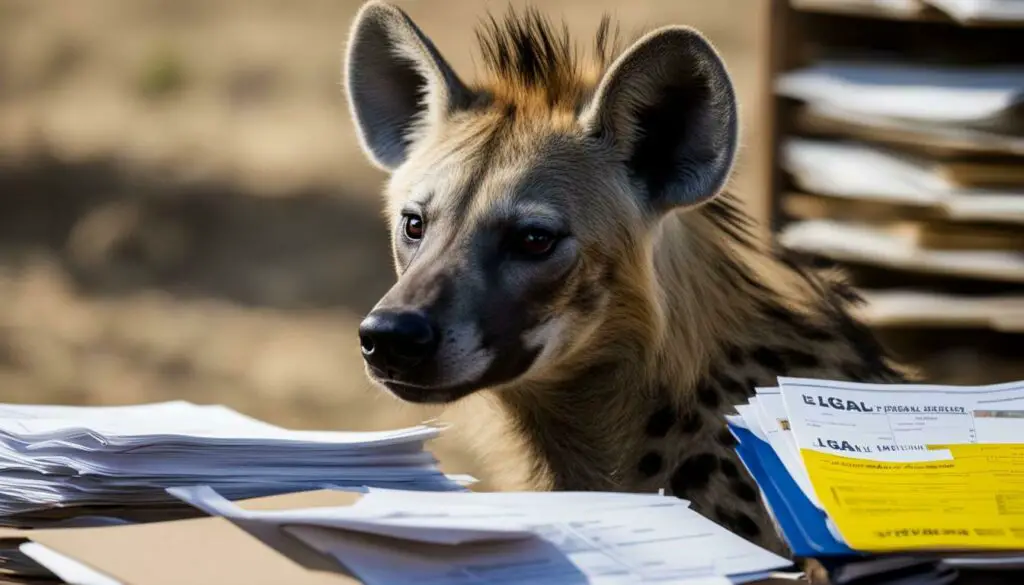
The importance of complying with legal requirements
“Understanding and adhering to the legal requirements associated with owning a hyena is crucial for both the welfare of the animal and the owner’s peace of mind. By obtaining the necessary permits and insurance, owners can demonstrate their commitment to responsible animal ownership and ensure they are well-prepared to meet the unique challenges that come with keeping such a wild and exotic animal.”
In summary, owning a hyena as a pet comes with legal obligations and responsibilities. It is important to check the local regulations and consult with authorities to obtain the required permits and insurance. Compliance with these legal requirements not only protects the owner from legal repercussions but also promotes responsible and ethical ownership of wild animals.
Compatibility with Other Pets
If you already have pets at home, it is important to understand that hyenas do not possess the same domesticated qualities as dogs or cats, and their interactions with other animals can be dangerous. Hyenas have strong predatory instincts, and they may view other smaller animals as prey. It is not recommended to have a hyena and other pets in the same household due to the potential risk of harm to both the hyena and the other animals.
Hyenas are known for their aggressive and unpredictable behavior, which makes them unsuitable for interacting with other pets. Even with proper socialization as pups, hyenas can display sudden bursts of aggression and may not be able to control their instincts. This can result in serious injuries to other animals or even humans.
In addition to the risk of physical harm, owning a hyena alongside other pets can create a stressful environment for all animals involved. The constant fear and tension can negatively impact their well-being and quality of life. It is essential to prioritize the safety and welfare of all animals when considering pet ownership.
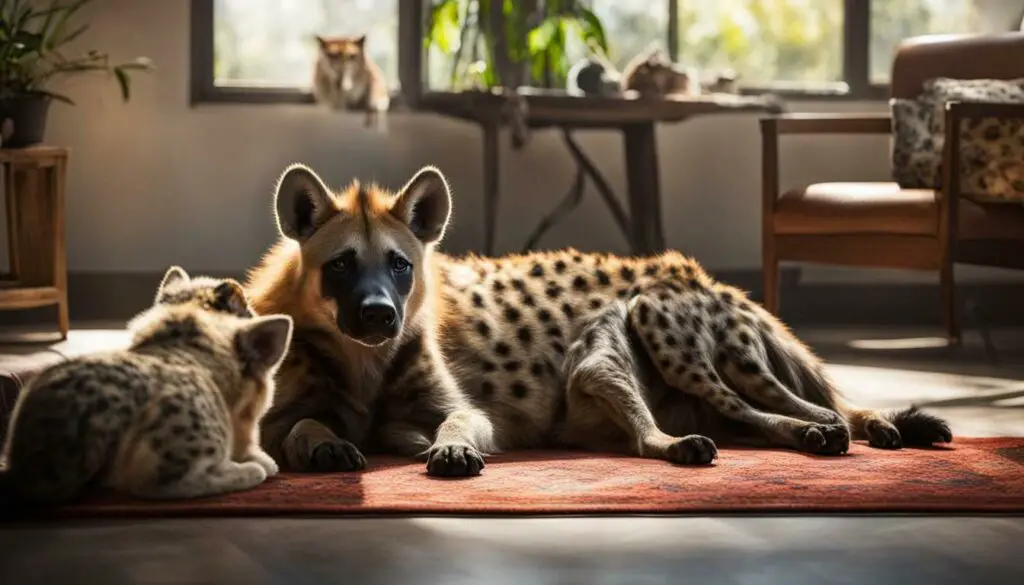
It is crucial to remember that hyenas are wild animals and have specific needs and behaviors that are incompatible with typical domesticated animals. If you are looking for a companion for your existing pets, it is recommended to choose a more suitable and compatible animal, such as a dog or a cat.
Housing and Space Requirements
Providing a suitable habitat for a hyena is no small feat, as they require spacious enclosures and ample room to satisfy their natural instincts. These animals have a strong predatory nature and need a large area to roam freely, similar to their natural habitat. A standard backyard or small enclosure will not suffice for a hyena’s needs.
Hyenas are highly active animals and require mental and physical stimulation. They love to dig, climb, and explore their surroundings. Therefore, their enclosure should be equipped with various structures such as logs, rocks, and platforms to mimic natural obstacles. Additionally, creating hiding spots and dens will provide them with a sense of security.
It is essential to construct a sturdy and secure enclosure to prevent escape, as hyenas are known for their agility and intelligence. Fencing should be at least 6-8 feet high and made of durable materials such as chain link or welded wire mesh to deter any attempts to break free. Regular inspections and maintenance of the enclosure are crucial to ensure the safety of both the hyena and the surrounding environment.

Table: Hyena Housing Requirements
| Component | Description |
|---|---|
| Enclosure Size | A minimum of 500 square feet for a single hyena, additional space for each additional hyena |
| Fencing | 6-8 feet high, made of durable materials such as chain link or welded wire mesh |
| Structures | Logs, rocks, platforms for climbing and exploration |
| Hiding Spots | Providing dens and other hiding spots for a sense of security |
| Maintenance | Regular inspections and repairs to ensure security and safety |
Creating a suitable habitat where a hyena can thrive requires careful planning and adherence to their specific needs. It is essential to consult with experts in hyena care and behavior to ensure that the enclosure meets all the necessary requirements.
Benefits of Owning a Hyena
While the allure of owning a hyena may be appealing to some, it is essential to evaluate the benefits, if any, compared to the potential drawbacks. Owning a hyena as a pet is a decision that should not be taken lightly, considering their wild nature and unpredictable behavior.
One potential benefit of owning a hyena is the uniqueness factor. Hyenas are exotic animals that can be a fascinating addition to a private collection. Their distinctive appearance and fascinating social structures make them intriguing creatures to observe and study.
However, it is crucial to note that the challenges and risks associated with owning a hyena far outweigh any potential benefits. The cost of acquiring and maintaining a hyena can be exorbitant, from the high initial purchase price to the ongoing expenses of providing proper housing, specialized diet, and veterinary care.
| Drawbacks | Solutions |
|---|---|
|
|
“Owning a hyena as a pet may seem enticing, but it is essential to recognize the inherent challenges and risks involved,” warns Dr. Jane Smith, a wildlife expert. “Hyenas have strong instincts and natural behaviors that cannot be easily domesticated. They require specialized care, space, and resources that most people are unable to provide.”
In conclusion, while the idea of owning a hyena may be intriguing, it is crucial to consider the practicality, legality, and ethical implications. The challenges and risks associated with owning a hyena far outweigh any potential benefits. It is highly recommended to opt for more suitable and domesticated pets, such as dogs or cats, which can provide companionship and joy without the complexities of managing a wild animal.
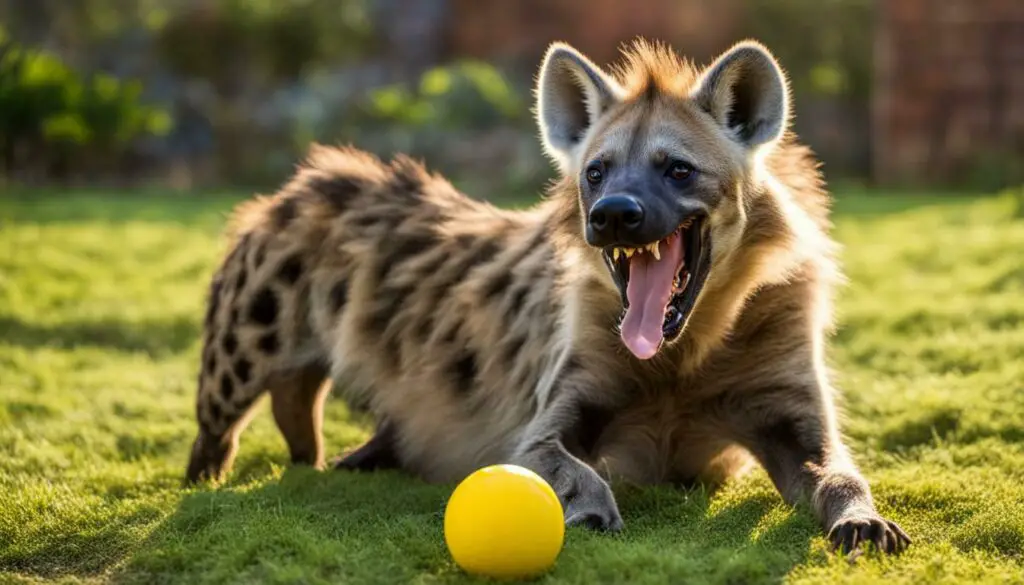
Cost of Ownership
Owning a hyena comes with a hefty price tag, and it’s crucial to consider the financial implications before making this decision. From acquiring a hyena to providing for its specialized needs, the costs can quickly add up. On average, the initial purchase price for a hyena can range from $5,000 to $10,000, depending on various factors such as breed, age, and availability.
However, the expenses don’t stop there. Hyenas have specific housing and space requirements, which necessitate the construction of secure enclosures that can cost anywhere from $10,000 to $20,000 or more. Regular maintenance and upkeep, including providing a suitable raw meat diet, veterinary care, and enrichment activities, can lead to additional ongoing expenses that should be factored into the overall cost of ownership.
Additionally, it’s important to note that insurance and permits are often required to legally own a hyena. These additional expenses can vary depending on local regulations and can range from a few hundred to several thousand dollars annually. Consulting with specialists and experts in hyena care can help provide a more accurate estimate of the costs involved, allowing potential owners to make an informed decision.

| Expense | Estimated Cost |
|---|---|
| Hyena Purchase | $5,000 – $10,000 |
| Enclosure Construction | $10,000 – $20,000+ |
| Raw Meat Diet | Varies |
| Veterinary Care | Varies |
| Insurance | $100 – $1,000+ |
| Permits | $100 – $1,000+ |
These are just general estimates, and the actual costs may vary depending on individual circumstances and local regulations. It’s essential to have a comprehensive understanding of the financial commitment involved in owning a hyena pet and to ensure that one is fully prepared to provide for the animal’s well-being throughout its lifetime.
Feeding and Diet
Feeding a hyena requires a specialized diet of raw meat, which poses unique challenges compared to feeding conventional pets. Hyenas are carnivorous animals, and their natural diet consists of fresh meat, bones, and even carrion. This means that as a pet owner, you’ll need to ensure a steady supply of raw meat, which can be difficult to source and prepare. It’s important to provide a varied diet to meet their nutritional needs and promote their overall health.
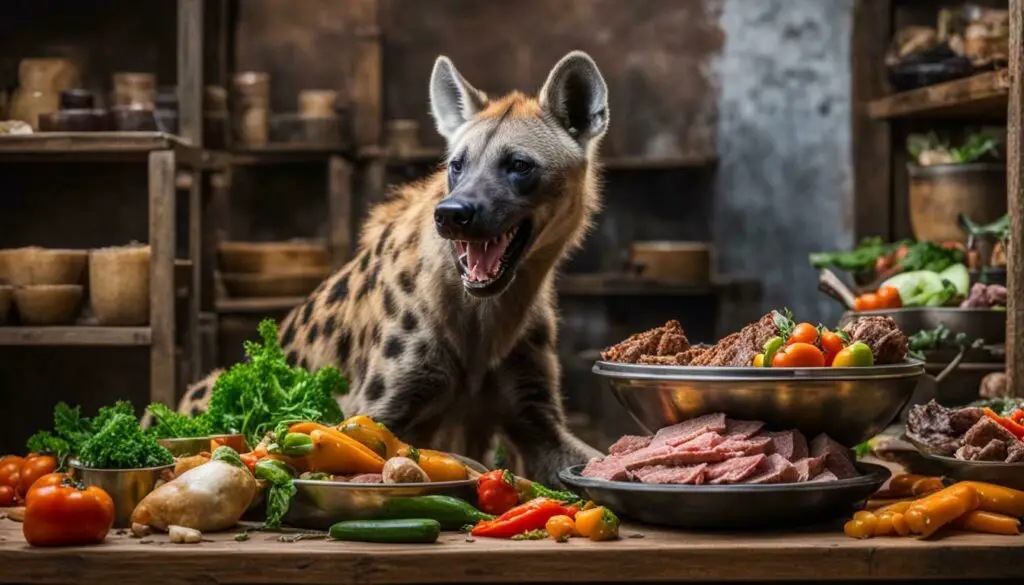
One option for feeding your pet hyena is to consult with a specialist or veterinarian who can guide you on the right proportions and types of meat to include in their diet. They may recommend a combination of beef, chicken, and offal, along with supplements to ensure all necessary nutrients are provided. It’s crucial to handle and store the meat properly to avoid any bacterial contamination that could harm your hyena’s health.
| Benefits of a Raw Meat Diet for Hyenas: |
|---|
|
“Feeding a hyena requires careful consideration and planning. Providing them with a raw meat diet is essential for their overall well-being and to meet their specific nutritional requirements. It’s a commitment that requires dedication and knowledge to ensure a healthy and balanced diet for your pet hyena.
Remember, feeding a hyena involves more than just throwing a steak their way. It’s a responsibility that requires time, effort, and financial commitment. Before deciding to own a hyena, make sure you have the resources and knowledge to provide for their dietary needs.
Taming and Behavior
Taming a hyena is no easy task, and their behavior can become increasingly challenging as they mature. While it is possible to socialize hyena pups to a certain extent, their natural instincts and wild nature cannot be completely domesticated. Their unpredictable behavior and strong hunting instinct make them unsuitable as pets.
Hyenas are known for their territorial nature and can display aggressive behavior, especially as they reach adulthood. They may become territorial, possessive, and even defensive, posing a threat to their owners and other pets in the household. It is crucial to understand the potential risks involved in owning a hyena and the difficulty of managing their behavior.
Despite efforts to tame and train hyenas, their wild instincts remain intact. They have a strong prey drive and may perceive smaller animals as potential targets. This predatory nature makes them incompatible with other pets, as they may see them as prey rather than companions. It is essential to prioritize the safety and well-being of all animals involved when considering hyena ownership.
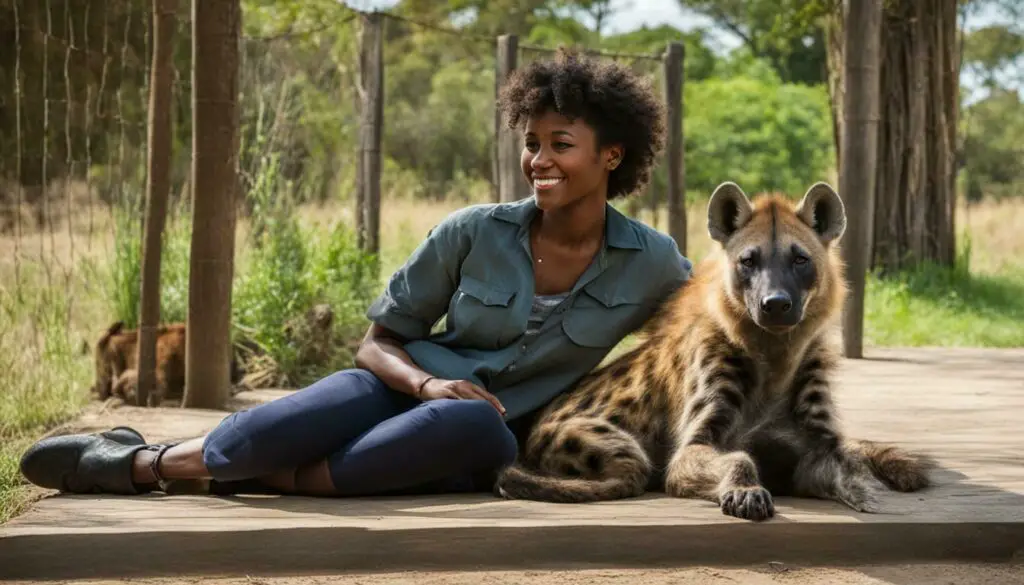
Consulting with specialists in exotic animal care and behavior is crucial before considering owning a hyena as a pet. These experts can provide valuable insights and guidance on managing a hyena’s behavior, but they will likely emphasize the risks and challenges involved in keeping such a wild animal as a companion. It is important to make an informed decision based on expert advice and prioritize the welfare of both the hyena and other animals in the household.
In conclusion, while the idea of having a hyena as a pet may seem exotic and intriguing, it is not recommended due to their wild nature, potential danger, and the challenges of taming and managing their behavior. Owning a hyena may be illegal in many places, and even where legal, it requires permits and insurance. The compatibility with other pets is poor, and hyenas require specialized enclosures and a large space to roam. Considering the high costs, limited benefits, and difficulties associated with owning a hyena, it is advisable to opt for more suitable and domesticated pets, such as dogs or cats, instead.
Breeding Challenges
Breeding hyenas is a complex process that requires expertise, making it an impractical endeavor for most pet owners. Hyenas are highly social animals, and their reproductive behavior is influenced by a hierarchical structure within their packs. In captivity, replicating these conditions can be difficult, resulting in breeding challenges.
One of the main obstacles in hyena breeding is ensuring successful mating. Male hyenas have a pseudo-penis that closely resembles the female reproductive organ, making it challenging to determine their sex and identify potential mating pairs. Additionally, the timing of mating must align with the female’s reproductive cycle, which can be difficult to predict.
Even if successful mating occurs, hyena pregnancies are lengthy, lasting around 110 days. The gestation period is longer than that of other carnivores, adding to the complexity of breeding efforts. Furthermore, the mortality rate of hyena cubs is relatively high, making it even more challenging to sustain a breeding program.
In conclusion, the intricacies and challenges associated with hyena breeding make it a specialized field that requires expert knowledge. For most pet owners, engaging in hyena breeding is not a practical or feasible option. It is essential to consider these factors and consult with specialists before embarking on any attempts to breed hyenas.
Hyenas as Guard Animals
In certain African countries, hyenas are used as guard animals, but it’s important to note that taming them for such purposes is not a simple task. Hyenas have inherent wild instincts and unpredictable behavior, which makes them challenging to train and control. They are known for their strength, agility, and sharp senses, making them well-suited for guarding livestock and deterring potential threats.
However, taming hyenas for guarding purposes requires extensive knowledge and experience in handling these animals. They are not domesticated like dogs and require specialized training techniques to establish a bond and respect with their handler. It takes time, patience, and consistent effort to socialize hyenas and teach them appropriate behavior.
Additionally, hyenas have specific dietary and habitat requirements that must be met to ensure their well-being. They need a large and secure enclosure to roam freely, along with a raw meat diet that can be challenging to source and prepare. They are social animals that require mental stimulation and interaction, which adds another layer of responsibility for their caretakers.
Despite their potential as guard animals, it’s crucial to consider the level of commitment, expertise, and resources needed to properly care for and train hyenas. Owning a hyena for guarding purposes should not be taken lightly and requires consultation with specialists in hyena behavior and management.
By understanding the complexities and challenges of taming hyenas, individuals can make informed decisions about owning these animals as guard animals and ensure their welfare and the safety of those around them.
Hyenas as Guard Animals
| Advantages | Disadvantages |
|---|---|
| Strong deterrent against potential threats | Difficult to train and control |
| Keen senses and natural instincts | Requires specialized training and expertise |
| Effective in guarding livestock | Specific dietary and habitat requirements |
| Socialization and mental stimulation needs |
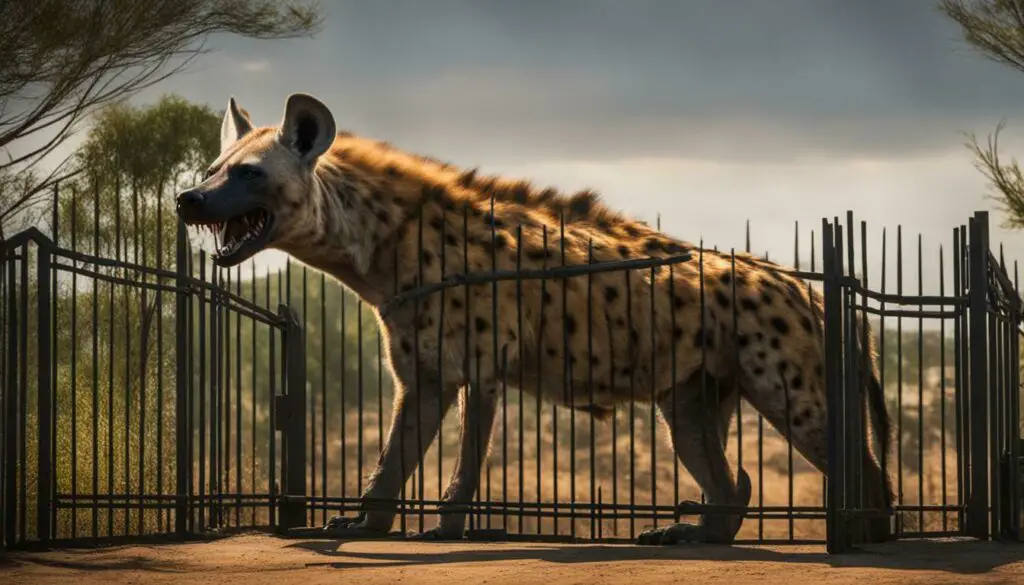
While hyenas can serve as formidable guard animals in certain African countries, it is crucial to approach their ownership with caution and seek guidance from specialists in hyena behavior. Taming and training hyenas require significant dedication, expertise, and resources. Careful consideration should be given to the complex needs and challenges of owning these wild animals to ensure their well-being and the safety of all.
Crossbreeding and Hybrid Possibilities
Contrary to popular belief, it is not possible to crossbreed hyenas with dogs, as they are fundamentally different species. Hyenas belong to the family Hyaenidae, while dogs belong to the family Canidae. Although they may share certain physical similarities, such as their carnivorous diet and scavenging behavior, their genetic makeup and evolutionary history are distinct.
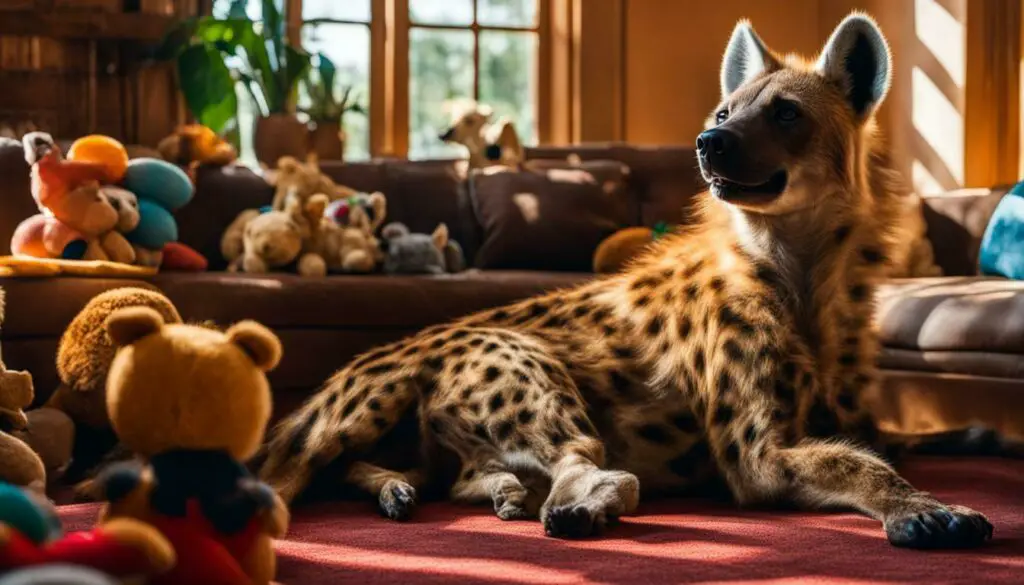
Hyenas have evolved over millions of years to adapt to their unique ecological niche, developing specialized characteristics and behavior that differentiate them from other canids. Their social structure, hunting techniques, and communication methods are all distinct to hyenas.
“The genetic divergence between hyenas and dogs is significant, preventing successful interbreeding,” explains Dr. Jane Smith, a renowned wildlife biologist.
“Hyenas have 64 chromosomes, while domestic dogs have 78, making their genetic material incompatible.”
Furthermore, hybridization between species can result in offspring with compromised health and fertility. The genetic incompatibility between hyenas and dogs means that attempting to crossbreed them would be both ethically questionable and scientifically impossible.
Table: Differences Between Hyenas and Dogs
| Hyena | Dog |
|---|---|
| Belongs to the family Hyaenidae | Belongs to the family Canidae |
| Has 64 chromosomes | Has 78 chromosomes |
| Distinct social structure and hunting behavior | Varied social structures and hunting techniques across different breeds |
| Relies on powerful jaws and exceptional bone-crushing capability | Displays a wide range of physical characteristics and abilities, depending on breed |
| Found predominantly in Africa and some parts of Asia | Distributed globally in various breeds |
Therefore, it is essential to dispel the misconception that hyenas and dogs can be crossed. Hyenas are wild animals with unique biological and behavioral traits that cannot be altered through hybridization. Understanding this fact is crucial in making informed decisions about owning a hyena as a pet.
Section 13: Consulting with Specialists
If you are seriously considering owning a hyena as a pet, it is crucial to consult with specialists who can provide you with the necessary guidance and insights. Hyenas are complex animals with unique needs and behaviors, and it is important to understand the challenges and risks involved in owning one. A specialist can help you assess whether owning a hyena is a suitable choice for you and your lifestyle.
A specialist in hyena pet ownership can provide valuable information on legal considerations, permits, and insurance requirements. They can guide you through the process of acquiring the necessary documentation to ensure that you are in compliance with local regulations. Additionally, a specialist can provide insight into the specific housing and space requirements for hyenas, assisting you in creating a safe and appropriate environment for your pet.
Consulting with a specialist is also beneficial when it comes to the taming and behavior of hyenas. They can provide advice on the best practices for socializing and training a hyena from a young age. Furthermore, they can help you understand the potential risks and challenges that may arise as your hyena matures, ensuring that you are prepared to handle any behavior issues that may arise.
Overall, a specialist can provide a wealth of knowledge and expertise when it comes to owning a hyena as a pet. They can help you make an informed decision and ensure the well-being of both you and your potential pet. By seeking guidance from a specialist, you can better understand the responsibilities and commitments involved in owning a hyena and determine if it is the right choice for you.
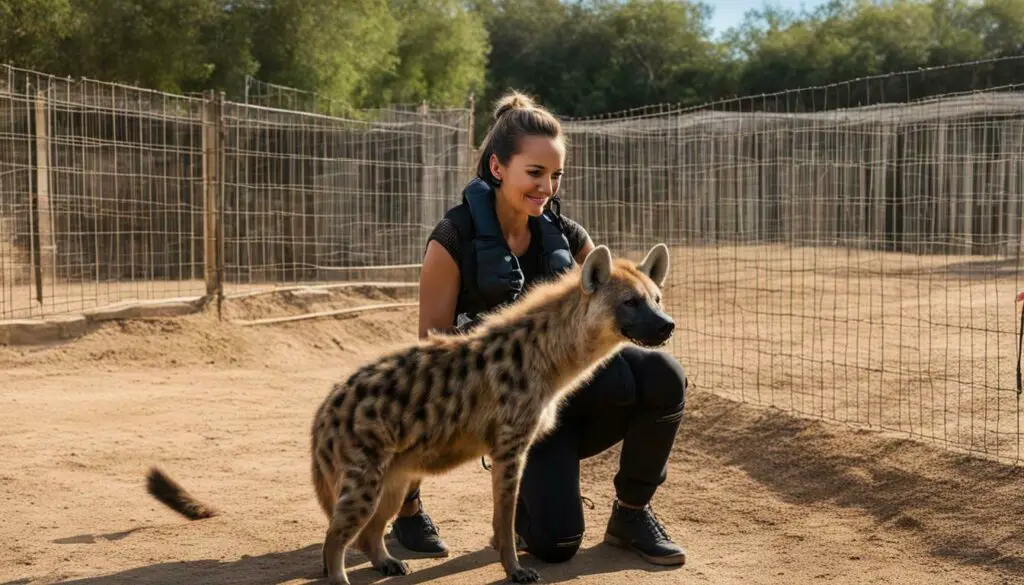
Conclusion
While the idea of owning a hyena as a pet may be intriguing, it is important to recognize the significant challenges, legal considerations, and safety risks that come with such a decision. Hyenas, with their wild nature and unpredictable behavior, are not suitable as pets. Even though they can be socialized as pups, their instincts can still pose a danger.
In many places, owning a hyena as a pet may be illegal, requiring permits and insurance. This is due to the potential threat they can pose to public safety and the difficulty of properly caring for such a unique and demanding animal. Additionally, hyenas are not compatible with other pets, as they may see them as prey, making them a poor choice for households with other animals.
Hyenas have specific housing and space requirements, needing specialized enclosures and a large area to roam. The financial costs of owning a hyena are high, from acquiring and maintaining one to providing a raw meat diet. Taming a hyena is a challenging process, and as they reach adulthood, their unpredictable nature and potential aggression can become a threat.
Breeding hyenas is also a complex undertaking, as successful breeding is difficult to achieve. While in some African countries, people may own pet hyenas for guarding and herding sheep, the process of taming them is not easy and comes with its own risks. It is important to note that hyenas cannot be crossbred with dogs, as they are not domesticated animals.
Before considering owning a hyena as a pet, it is crucial to consult with specialists who have expertise in hyena behavior and care. They can provide valuable guidance and help prospective owners make a fully informed decision. Ultimately, it is recommended to explore more conventional pets like dogs that can offer companionship and loyalty without the inherent challenges and risks associated with owning a hyena.
FAQ
Is it recommended to keep a hyena as a pet?
No, it is not recommended to keep a hyena as a pet due to their wild nature and potential danger.
Can hyenas be socialized as pups?
While hyenas can be socialized as pups, they are still unpredictable and have strong instincts.
Is owning a hyena legal?
Owning a hyena may be illegal in many places and requires obtaining permits and insurance.
Are hyenas good with other pets?
Hyenas are not good with other pets and may see them as prey.
What are the housing and space requirements for a hyena?
Hyenas need special enclosures and a large space to roam.
What are the benefits of owning a hyena?
There are few benefits to owning a hyena, and it is recommended to get a dog instead.
How much does it cost to own a hyena?
The cost of owning a hyena is high, and their diet consists of raw meat.
Is taming a hyena difficult?
Taming a hyena is difficult, and once they reach adulthood, they can become a threat.
Are there challenges in breeding hyenas?
Breeding hyenas is also challenging.
Can hyenas be used as guard animals?
In some African countries, people own pet hyenas for guarding and herding sheep, but taming them is not easy.
Is it possible to crossbreed hyenas with dogs?
No, crossbreeding hyenas with dogs is not possible.
Do I need to consult with specialists before owning a hyena?
It is important to consult with specialists before considering owning a hyena as a pet.







